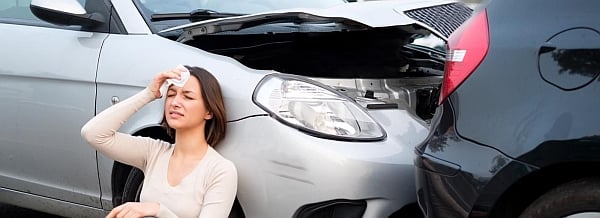A concussion is a type of car accident injury and traumatic brain injury that often occurs after a car crash, caused by a forceful impact or jolt to the head or body. While some symptoms may appear immediately, others can take hours or even days to manifest, making it crucial to recognize the warning signs early. Concussions can range from mild to severe, and if left untreated, they may lead to serious complications, including post-concussion syndrome or prolonged cognitive impairments.
In this blog, we’ll discuss the key signs of a concussion after a car crash and emphasize the importance of seeing an experienced car accident doctor for proper diagnosis and treatment.
Immediate Concussion Symptoms
Recognizing the common symptoms and immediate signs of a concussion after a car crash is vital. These symptoms can indicate a mild traumatic brain injury that requires prompt attention. Here are some key signs to watch for:
- Loss of consciousness: This can happen even if it’s brief. If you or someone else loses consciousness, it’s crucial to seek medical help right away.
- Headache or pressure in the head: A sudden headache or a feeling of pressure can signal a concussion.
- Nausea or vomiting: Feeling sick to your stomach or actually vomiting can be a sign of a concussion.
- Confusion or disorientation: If you feel confused, disoriented, or have trouble focusing, these could be symptoms of a concussion.
- Dizziness or balance problems: Difficulty maintaining balance or feeling dizzy is another indicator.
- Weakness or numbness: If you experience weakness, numbness, or trouble walking or talking, these are serious symptoms that should not be ignored.
- Slurred speech or delayed responses: Speaking slowly or having slurred speech can also suggest a concussion.
Observable Signs in Others
Recognizing the signs of a head injury and concussion in others is just as critical as identifying them in yourself. If you witness someone involved in a car crash, pay close attention to their behavior and physical condition. This awareness can lead to quicker medical intervention.
- Appears dazed or stunned: The individual may seem disoriented or confused. They might not respond to questions promptly or could have a blank stare.
- Moves clumsily: Look for unsteady movements or difficulty in maintaining balance. This may indicate a lack of coordination, which is a common symptom of a concussion.
- Answers questions slowly: If the person is taking longer than usual to respond, it might suggest cognitive impairment. They may struggle to process information or recall details about the accident.
- Shows mood, behavior, or personality changes: Sudden shifts in mood or behavior can signal a concussion. This may include irritability, emotional outbursts, or withdrawal from social interaction.
Delayed Symptoms
After a car crash, some concussion symptoms may not surface immediately. These delayed symptoms can be just as significant and often require attention, along with other symptoms that may not be immediately apparent.
- Symptoms may appear hours, days, or even weeks after the accident. This delay can lead to confusion, as you might feel fine initially but later experience concerning changes.
- Common delayed symptoms include headaches that start mild but worsen over time. Dizziness and vision problems can also develop, making it hard to focus or see clearly.
- You might notice difficulty concentrating or remembering details about the accident. This cognitive impairment can affect your daily life, making tasks feel overwhelming.
- Sleep disturbances are another common issue. You may struggle with insomnia or find yourself excessively sleepy during the day, impacting your overall well-being.
Red Flags for Severe Injury
Recognizing red flags for severe head injuries after a car crash is vital. These signs indicate a more serious injury that requires immediate medical attention. If you or someone else exhibits any of the following symptoms, do not hesitate to call emergency services or head to the nearest hospital.
- Loss of consciousness for longer than 30 minutes: If someone loses consciousness and does not regain it quickly, this is a serious concern. Prolonged unconsciousness can signal significant brain injury.
- Headache that worsens over time or is severe: A headache that intensifies or does not improve with over-the-counter medication may indicate complications. This symptom should not be ignored.
- Repeated vomiting: While nausea is common after a concussion, vomiting multiple times can suggest increased intracranial pressure or other serious issues.
- Numbness or weakness in the arms or legs: This can indicate damage to the brain or spinal cord. If someone experiences these symptoms, it is essential to seek medical help immediately.
- Seizure or convulsion: Experiencing a seizure after a car accident is a critical warning sign. It could mean that the brain has sustained serious trauma, requiring urgent evaluation.
- Unusual behavior, such as inability to recognize people or places: If a person is confused or cannot identify familiar surroundings or individuals, this could be a sign of a significant brain injury. Immediate medical assessment is crucial in these cases.
Cognitive and Emotional Symptoms
After a car crash, recognizing cognitive and emotional symptoms is essential for understanding the potential impact of a concussion. These symptoms can significantly affect your daily life and overall well-being. Seeking medical treatment for these symptoms is crucial for proper recovery.
Difficulty Concentrating
One common sign of a concussion after a car accident is trouble concentrating. You may find it hard to focus on tasks, follow conversations, or remember details. This can be frustrating and may affect your performance at work or school.
Memory Loss
Memory loss is another critical symptom. This can include difficulty recalling events leading up to the accident or forgetting recent conversations. Even mild traumatic brain injuries can cause gaps in memory, making it important to remain aware of these changes.
Mood Swings
Emotional changes often accompany concussions. You might experience sudden mood swings, feeling irritable or anxious without a clear reason. These shifts can strain relationships and affect your ability to cope with everyday challenges.
Depression and Restlessness
Some individuals may develop feelings of depression or restlessness after a concussion. These emotional responses can be distressing and may require support from friends, family, or mental health professionals.
Sleep Disturbances
Sleep patterns can also be disrupted. You might have trouble falling asleep, staying asleep, or experiencing excessive drowsiness during the day. These changes can hinder your recovery and overall quality of life.
Importance of Medical Attention
Recognizing the importance of medical attention after a car crash is vital for your health and recovery. If you suspect you have suffered a concussion, taking prompt action is essential.
Immediate Response
If you experience any red flags, such as loss of consciousness or severe headaches, seek immediate medical help. These symptoms can indicate a more serious brain injury that requires evaluation by a medical professional. Emergency rooms are equipped to conduct necessary imaging tests, such as CT scans, to assess your condition thoroughly.
Professional Evaluation
Consulting medical professionals after a car accident is crucial to seek medical treatment. They can perform cognitive tests to evaluate your mental state and recommend appropriate treatment. A thorough examination helps rule out more serious injuries, ensuring that you receive the correct care for your concussion injury.
Delayed Symptoms
Be aware that symptoms can develop hours or even days after the incident. If you notice any delayed symptoms, such as persistent headaches or difficulty concentrating, it is important to visit your doctor. Ignoring these symptoms can lead to complications, including post-concussive syndrome. Maintaining records of these symptoms can support a personal injury claim.
Follow-Up Care
After the initial evaluation, follow-up care is essential. This may include physical therapy or occupational therapy to help restore normal function. Staying engaged with your healthcare provider ensures you are on the right path to recovery and can address any ongoing concerns.
Schedule an Appointment to See a Car Accident Doctor ASAP!
If you suspect you’ve suffered a concussion or any car accident injury from a car crash, don’t wait—contact our team at Hurt 911® today. We’re here to connect you with experienced medical professionals and legal experts who can help you get the care and compensation you deserve.
Schedule an appointment with us today at 404-687-9000!








